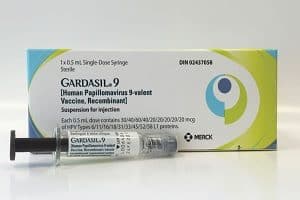
Feds Say Gardasil is Safe. Federal health regulators are insisting that Gardasil is safe, despite thousand of reports of adverse events related to the controversial cervical cancer vaccine. Officials at the Food & Drug Administration (FDA) and Centers for Disease Control (CDC) said they have reviewed the adverse event reports, and said that they […]

Feds Say Gardasil is Safe. Federal health regulators are insisting that Gardasil is safe, despite thousand of reports of adverse events related to the controversial cervical cancer vaccine. Officials at the Food & Drug Administration (FDA) and Centers for Disease Control (CDC) said they have reviewed the adverse event reports, and said that they cannot find a connection between Gardasil and the reported problems.
Gardasil was approved by the U.S. Food & Drug Administration (FDA) in June 2006. At the time of its approval, Merck & Co. said that clinical trials had proven the vaccine to be between 90-100% effective in preventing the transmission of some strains of HPV that cause cervical cancer. The approval of Gardasil was much hyped, with Merck claiming that it had the potential to eventually eliminate most cervical cancers.
Just weeks after its approval, the CDC recommended that all young girls between the ages of 11 and 12 receive the Gardasil vaccine. Merck was more than happy to echo the CDC recommendations, and actually began an intensive lobbying effort to convince state health authorities to make Gardasil vaccinations mandatory for young girls.
As of June 30, 2008, there have been 9,749 Vaccine Adverse Event Reporting System (VAERS) reports of adverse events following Gardasil vaccination. Of these, 6 percent were deemed serious. The adverse event reports included 20 deaths, as well as reports of a rare neurological condition called Guillain-Barré Syndrome.
Despite these disturbing reports, the FDA and CDC are standing by ‘Gardasil’. “There was not a common pattern to the deaths that would suggest they were caused by the vaccine,” the FDA and CDC said in a statement.
Regarding other serious problems reported in relation to Gardasil, the CDC and FDA claimed the data “do not currently suggest an association” between Gardasil and the conditions.
Earlier this month, the FDA and Merck announced that the prescribing information for ‘Gardasil’ was being updated to include warnings about some of the more minor reactions seen after the vaccine, including joint and muscle pain, fatigue, physical weakness and general malaise.
At the time, FDA spokeswoman Karen Riley told The Washington Times that the label updates have “nothing to do with” the serious cases that have been reported. She said the updates were made at Merck’s request and touch on possible “mild” symptoms.
Meanwhile, efforts are still underway in some states to place Gardasil on the roster of vaccines that are mandatory for girls. Even one researcher who worked on ‘Gardasil’ is against such a move. Dr. Diane Harper, a top expert on the HPV who, while working as a professor at Dartmouth College, served as a researcher on study trials for Gardasil.
In May during with a Florida TV station, Dr. Harper criticized Merck’s efforts to make Gardasil mandatory. In the interview, Dr. Harper said that there has not been enough post-marketing surveillance of ‘Gardasil’ to insure that it is free of side effects that could prove particularly dangerous to young girls.
“We don’t know yet what’s going to happen when millions of doses of the vaccine have been given and to put in place a process that says you must have this vaccine, it means you must be part of a big public experiment. So we can’t do that until we have more data.” she said.
Merck is also moving ahead with plans to obtain approval to have ‘Gardasil’ administered to boys.
The personal injury attorneys at Parker Waichman LLP offer free, no-obligation case evaluations. For more information, fill out our online contact form or call 1-800-YOURLAWYER (1-800-968-7529).


